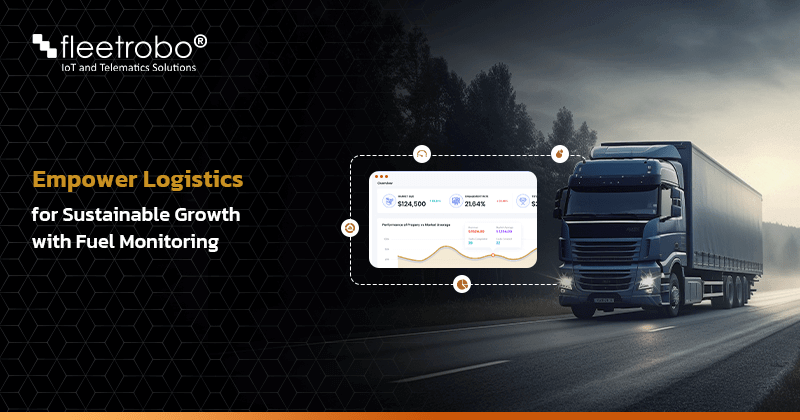Introduction
Logistics plays a paramount role in facilitating the operations and functioning of various established and emerging industries. Rising fuel prices in India is creating turbulent ripples in the logistics sector. These ripples are trickling down on other sectors that depend on logistics. Fuel tracking in logistics is essential for effective fuel usage, fuel management, and fuel efficiency.
Table of Contents
- The prospects of the Indian Logistics sector
- Fuel Monitoring: A Key to Competitive Logistics
- Fuel Monitoring: Challenges and Implications in Logistics
- Fuel Monitoring Device
- The operation of FleetRobo’s Fuel Monitoring System
- FleetRobo’s fuel monitoring for superior logistical operations
The prospects of the Indian Logistics sector
As of 2019, the logistics sector in India had a valuation of US$ 190 billion and provided direct employment to more than 22 million individuals. Projections indicate that the sector is anticipated to grow at a rate of 8-10% over the medium term.
Fuel Monitoring: A Key to Competitive Logistics
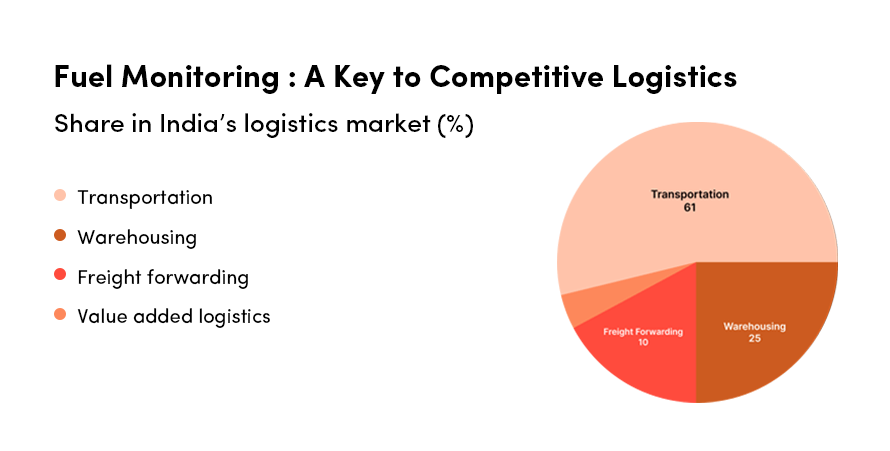
The operation of the Logistics sector
India’s logistics sector contributes to around 14.4 percent of the national GDP. However, more than 90 percent of this sector comprises unorganized businesses, including small, medium, and large fleet owners who frequently consume diesel in substantial quantities. Within the fleet industry, many operators incur significant losses due to inefficient diesel management. A private energy firm estimates that diesel mismanagement leads to almost a 10 percent loss in diesel bills. In order to prevent that, proper fuel monitoring systems are essential.
Skewed Multimodal Mix
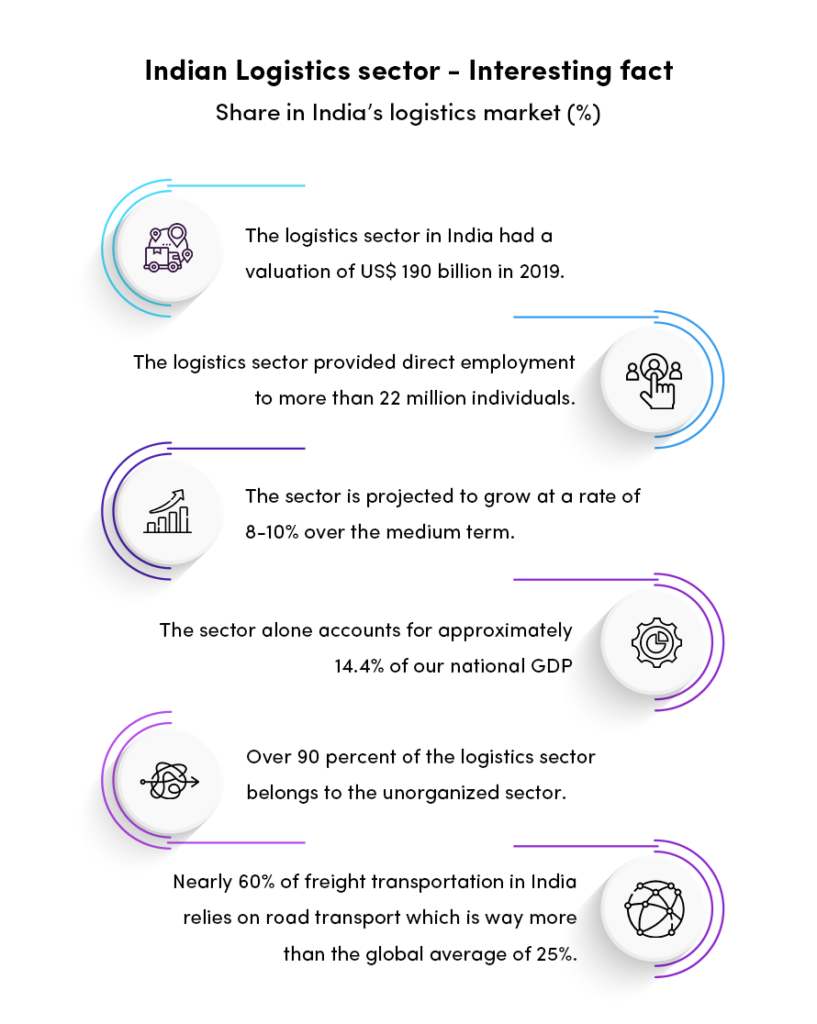
In India, road transportation remains the dominant mode for freight cargo movement. Currently, nearly 60% of freight transportation relies on road transport, primarily because of the convenience and ease that roads provide for logistics operations. On the other hand, railways constitute approximately 32%. Waterways have a relatively small share of approximately 5%.
In contrast, the global average for road transportation is 25%, and railways make up about 60% of freight transportation. So, without fuel tracking in logistics, the logistical business entity will lose a significant advantage over its competitors.
Impacts profit margin
Based on an estimate, India’s logistics sector incurs relatively higher expense. With increasing fuel costs, overall logistics costs will take a jump. This will make their profit margins wafer thin. So effective fuel usage is essential and without fuel tracking in logistics, it will be impossible to increase the sector’s effectiveness.
Impacts consumer and business entities
With increasing fuel costs, the logistics sector will pass the brunt to the consumers, including B2B industries. With transportation cost increase, the business will increase their product cost. As a result, consumers often find themselves paying higher prices for nearly all types of products, ranging from groceries and medicines to electronics and beyond. Hence, vehicle fuel tracking systems are critical to serve Indian consumer efficiently.
Impacts the competitiveness of Indian logistics business entity
Increased fuel consumption due to a skewed modal mix will increase the costs of logistics. The higher logistics costs are reducing the competitiveness of Indian logistical entity when compared to their global piers.
According to private reports, the increased logistics cost is creating a competitiveness gap of US$ 180 billion for India. By the year 2030, this gap is expected to widen further, reaching US$ 500 billion. Therefore, without a proper fuel inventory management system Indian Logistic players will be in an disadvantaged position.
Fuel Monitoring: Challenges and Implications in Logistics
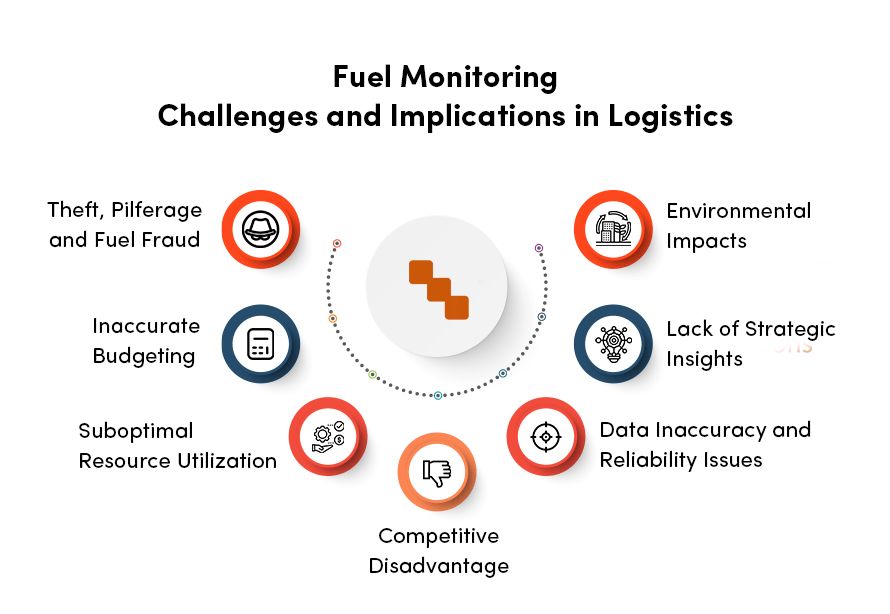
Theft, pilferage, and fuel fraud
Without fuel monitoring systems, your fleet manager cannot track consumption precisely. Without proper fuel tracking in logistics fleet managers cannot know about fuel fraud, fuel theft, and pilferage. Fuel tracking in logistics is essential to prevent such frauds.
Inaccurate Budgeting
The absence of an accurate fuel monitoring system poses significant challenges for logistics companies in effectively budgeting their expenses. This results in financial uncertainties and creates a dent on their profitability and operational efficiency.
Suboptimal resource utilization
Inefficient fuel usage from logistical vehicles can result in suboptimal resource allocation. This may include underutilization of vehicles or improper route planning, resulting in decreased operational efficiency, and decreased mileage for the logistics company. Proper fuel tracking in logistics can help optimize resource allocation and improve overall operational efficiency in the logistics sector.
Competitive Disadvantage
Competitors with better fuel management can optimize their fuel usage, reduce costs, and enhance operational efficiency. In contrast, the unmonitored company may face higher fuel expenses, reduced profitability, and decreased competitiveness in the market. So, unmonitored fuel consumption can put logistics companies at a disadvantage compared to competitors.
Data Accuracy and Reliability
When your logistics company does not monitor their fuel consumption, they lack crucial data and insights into their fuel usage patterns and costs. Further, without proper fuel management software in place, obtaining accurate and reliable fuel consumption data from various vehicles and equipment in a diverse fleet can be challenging. Inaccurate data can lead to erroneous decision-making and ineffective fuel management.
Data Analysis and Interpretation
Collecting fuel consumption data is one thing, but analyzing and interpreting the data to derive actionable insights can be complex. The real value of fuel monitoring systems lies in analyzing and interpreting that data to gain meaningful insights. This process can be challenging, as it requires data analysis skills and expertise.
Lack of Strategic Insights
A logistical firm, that has a vehicle fuel tracking system in place, can make data-driven decisions, stay competitive among their peers, and achieve better cost management in their operations.
But, without necessary skills, logistics companies may struggle to make informed decisions based on the data, hindering their ability to optimize fuel usage and improve overall operational efficiency.
Without fuel tracking in logistics, the companies may miss out on valuable insights that can aid in making data-driven decisions and optimizing their operations.
Environmental Impact
Unmonitored fuel consumption can contribute to higher carbon emissions, negatively impacting the environment and the company’s reputation in terms of sustainability.
Fuel Monitoring Device
A fuel monitoring device is a technological tool or system used to track, measure, and manage the consumption of fuel in vehicles, machinery, or any equipment that uses fuel as a power source. These devices are crucial in maintaining competitive advantage, especially in industries heavily reliant on fuel-driven vehicles and equipment such as logistics, transportation, and fleet management industries.
The operation of FleetRobo’s Fuel Monitoring System
A fuel monitoring sensor, a core hardware component, will be installed on the vehicle’s fuel tank. This fuel monitoring sensor is compatible with different sizes of fuel tanks. So, any type of logistical vehicle can easily be fitted with FleetRobo’s fuel monitoring sensor. The fuel monitoring sensor will transmit real-time data on the fuel level to the FleetRobo device to constantly monitor the fuel level and send alerts when it gets low.
A GPS Tracking device will also be installed in your logistical vehicle which provides a precise location of your vehicle in real time.
FleetRobo’s fuel monitoring for superior logistical operations
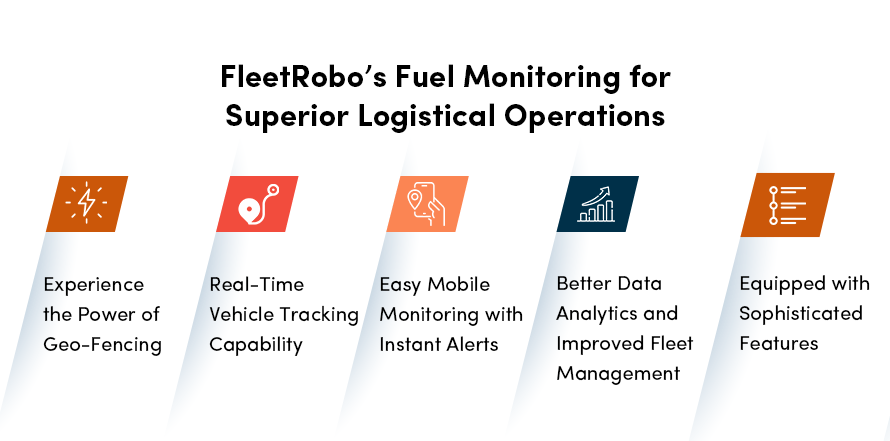
The power of Geo-Fencing
FleetRobo’s fuel management software will allow you to set up virtual boundaries for your logistical vehicles. When your vehicle crosses the boundary, which can be a warehouse or customer delivery location, you’ll be instantly notified.
Further, your drivers cannot divert from their normal route to alternative locations. If they do, then your Fleet Manager will get immediate notification. Thereby, alerting your driver to conserve fuel by rerouting.
Real-Time Vehicle tracking
Our fuel tracking in logistics ensures that you have real-time visibility of your vehicles’ locations and fuel levels at all times. This helps your logistical manager to know how much fuel is consumed and where it is consumed. Hence, your fleet manager can prevent any types of fuel theft, pilferage, and fuel frauds in real-time. Also, your manager can get real-time insights into the vehicle’s fuel level, driver’s driving habits, and more.
Easy Mobile Monitoring with instant alerts
With a simple mobile app, users can access real-time data on their fuel usage, enabling them to stay informed about their fuel levels and receive instant alerts when fuel levels are low or critical. Your warehouse managers can access this information from anywhere in the world.
Furthermore, you will also receive instant alerts whenever your vehicle’s fuel level changes. This enhances the overall user experience and ensures timely actions to manage fuel efficiently and effectively, regardless of the vehicle’s location.
Better data analytics and improved Fleet Management
With FleetRobo’s fuel tracking in logistics, you can get automated reports like the Idle Time Report and detailed Mileage Reports.
Not only that, but your manager can also get data on fuel consumed per vehicle, fuel consumption trends for weekly or monthly or for a trip, customized graphical and tabular data representations, etc. Hence, with our vehicle fuel tracking system, you can ensure precise fleet management & planning.
Other sophisticated features
FleetRobo’s GPS Tracking device can be fitted to trucks, small carriers, vans, and more. The device has a location accuracy up to 2.5 meters and consumes low power compared to competitors. With digital sensors, you can get an accuracy of up to 99%. So, any logistical entity trying to enhance efficiency and decrease expenses needs FleetRobo’s fuel monitoring system.
Conclusion
FleetRobo offers a wide range of advanced technological solutions that go beyond just fuel tracking in logistics. For instance, our GPS E-lock protects any valuable logistical cargo with an extra layer of tech-based physical security. With our Supply Chain Logistics solutions, you can monitor the goods from point of origin to point of consumption.
The logistics sector has wholeheartedly adopted these tech solutions, experiencing numerous benefits. The time has come for you to embrace FleetRobo products and experience remarkable advancements in your logistics business.
To get more details please visit the FleetRobo’s website.

